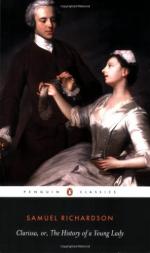A twelvemonth might very probably have put a period to my life; situated as I was with my friends; persecuted and harassed as I had been by my brother and sister; and my very heart torn in pieces by the wilful, and (as it is now apparent) premeditated suspenses of the man, whose gratitude I wished to engage, and whose protection I was the more entitled to expect, as he had robbed me of every other, and reduced me to an absolute dependence upon himself. Indeed I once thought that it was all his view to bring me to this, (as he hated my family;) and uncomfortable enough for me, if it had been all.
Can it be thought, my dear, that my heart was not more than half broken (happy as I was before I knew Mr. Lovelace) by a grievous change in my circumstances?—Indeed it was. Nor perhaps was the wicked violence wanting to have cut short, though possibly not so very short, a life that he has sported with.
Had I been his but a month, he must have possessed the estate on which my relations had set their hearts; the more to their regret, as they hated him as much as he hated them.
Have I not reason, these things considered, to think myself happier without Mr. Lovelace than I could have been with him?—My will too unviolated; and very little, nay, not any thing as to him, to reproach myself with?
But with my relations it is otherwise. They indeed deserve to be pitied. They are, and no doubt will long be, unhappy.
To judge of their resentments, and of their conduct, we must put ourselves in their situation:—and while they think me more in fault than themselves, (whether my favourers are of their opinion, or not,) and have a right to judge for themselves, they ought to have great allowances made for them; my parents especially. They stand at least self-acquitted, (that I cannot;) and the rather, as they can recollect, to their pain, their past indulgencies to me, and their unquestionable love.
Your partiality for the friend you so much value will not easily let you come into this way of thinking. But only, my dear, be pleased to consider the matter in the following light.
’Here was my mother, one of the most prudent persons of her sex, married into a family, not perhaps so happily tempered as herself; but every one of which she had the address, for a great while, absolutely to govern as she pleased by her directing wisdom, at the same time that they knew not but her prescriptions were the dictates of their own hearts; such a sweet heart had she of conquering by seeming to yield. Think, my dear, what must be the pride and the pleasure of such a mother, that in my brother she could give a son to the family she distinguished with her love, not unworthy of their wishes; a daughter, in my sister, of whom she had no reason to be ashamed; and in me a second daughter, whom every body complimented (such was their partial favour to me) as being the still more immediate likeness of herself? How, self pleased, could she smile round upon a family she had so blessed! What compliments were paid her upon the example she had given us, which was followed with such hopeful effects! With what a noble confidence could she look upon her dear Mr. Harlowe, as a person made happy by her; and be delighted to think that nothing but purity streamed from a fountain so pure!




